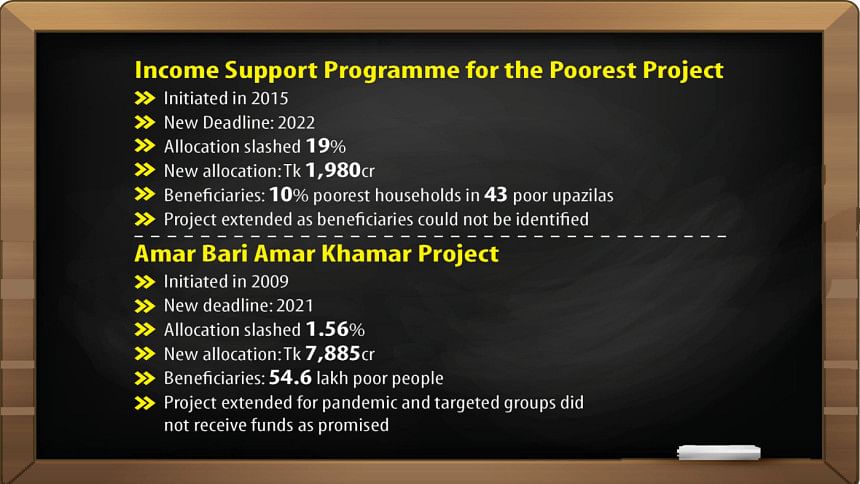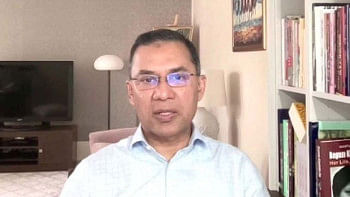Two projects for the poor see their allocations slashed

Irregularities and apathy have become a permanent feature of project implementation in Bangladesh, thanks to which no infrastructure is ever ready on time.
The delays mean, the costs are invariably raised -- and this has become commonplace in the country.
But yesterday, the unusual happened: the government slashed the allocation for two projects that were meant to help the poor.
One of the projects is designed to serve 600,000 poorest mothers and benefit 2.7 million poor people in 43 upazilas in four districts -- Gaibandha, Kurigram, Lalmonirhat and Nilphamari.
The project initiated a cash benefits programme for the poorest mothers and pregnant women in 2015 in exchange for their participation in activities to improve their children's nutrition and cognitive development.
It is expected to benefit 10 per cent of the poorest households across 43 of poor upazilas with high child malnutrition rates.
Now, the allocation for the project has been slashed 19 per cent to Tk 1,980 crore, largely because the main financier, the World Bank, has withdrawn $50 million owing to the slow implementation and failure to put in place a database of the beneficiaries, according to a planning ministry presentation.
The baseline work of the project has been completed.
But the beneficiaries could not be identified as household data with certain poverty score was not available from the Bangladesh Bureau of Statistics' National Household Database Project.
As a result, the beneficiaries did not get the cash transfers, said the planning ministry briefing presented after the meeting of the Executive Committee of the National Economic Council (Ecnec).
The tenure of the project has been expanded by two years. The project was due to complete in June 2020.
The WB had committed $300 million for the project. But it redirected $50 million in December last year from the slow-moving project to its another project taken for the Rohingya people.
Under the project, a pregnant woman is supposed to get Tk 1,000 each of the four times they go through medical check-up. They would get Tk 700 a month for 0-24 month-old babies and Tk 1,500 for every three months for 25-60 month-old babies.
Besides, pregnant women and lactating mothers would get Tk 700 each month if they attend workshops on child nutrition and improved education.
The project also aims to develop the capacity of local-level government to deliver safety net programmes.
Bangladesh has made remarkable progress in reducing poverty over the past two decades.
Yet, the country is among the 10 countries with the highest prevalence of malnutrition. About 31 per cent of children under the age of five are stunted.
The children from poor households bear a disproportionate burden of stunted growth.
Ensuring nutrition prenatally and in the early years helps to maximise a child's brain development and growth and is critical to boosting the earnings capacity in the later years of life and to prevent the transmission of poverty across generations.
Bangladesh spends more than 14 per cent of its budget on more than 100 safety net programmes. But only a small portion of this budget supports programmes that aim to improve maternal and child nutrition and cognitive development, according to the WB.
Similarly, the allocation for the Amar Bari Amar Khamar Project was slashed by Tk 125 crore and set at Tk 7,885 crore while approving its third revision.
The project, which is being implemented by the rural development and cooperatives division, aims at turning every household in villages into an agriculture-based income-generating unit and setting up village development association involving 60 poor, ultra-poor and beggars.
It will provide matching funds to the deposits of the beneficiaries and allocate evolving funds in grant to help them engage in income-generating activities.
The tenure of the project has been pushed back by a year to June 2021 as its implementation has been affected by the coronavirus pandemic, the planning ministry's brief said.
The project is receiving the fourth revision because the associations that have not received matching grants from the government against the deposits of the members and Tk 3 lakh evolving funds, will now get the grants and funds.
The allocation for the micro-entrepreneur development fund has been increased.
Under the project, 54.6 lakh poor people would benefit through 120,000 associations. The project covers all of the country's eight divisions, 64 districts and 492 upazilas.
When the project was initiated in 2009, Tk 1,197 crore was allocated.
In total, the Ecnec yesterday approved seven projects with an outlay of Tk 3,075 crore, including Tk 2,334 crore to modernise the sewerage system in Khulna city.
The Mujibnagar Irrigation Development Project was approved with a budget of Tk 231 crore and the deadline of June 2025.
Prime Minister Sheikh Hasina chaired the meeting.
The prime minister and the planning minister joined the meeting from Ganobhaban through a videoconference, while other Ecnec members were connected from the NEC Bhaban, reported UNB.

 For all latest news, follow The Daily Star's Google News channel.
For all latest news, follow The Daily Star's Google News channel. 



Comments